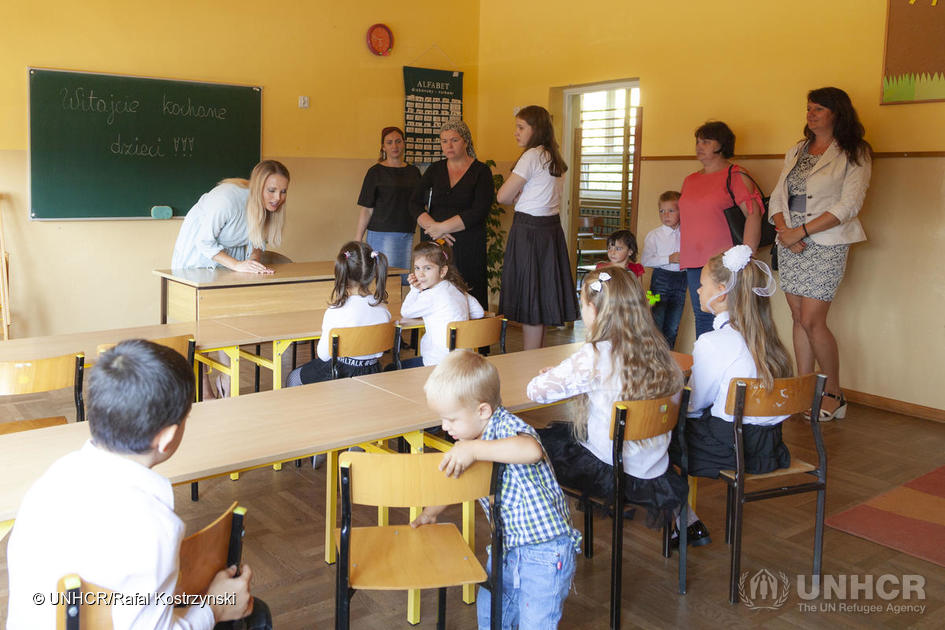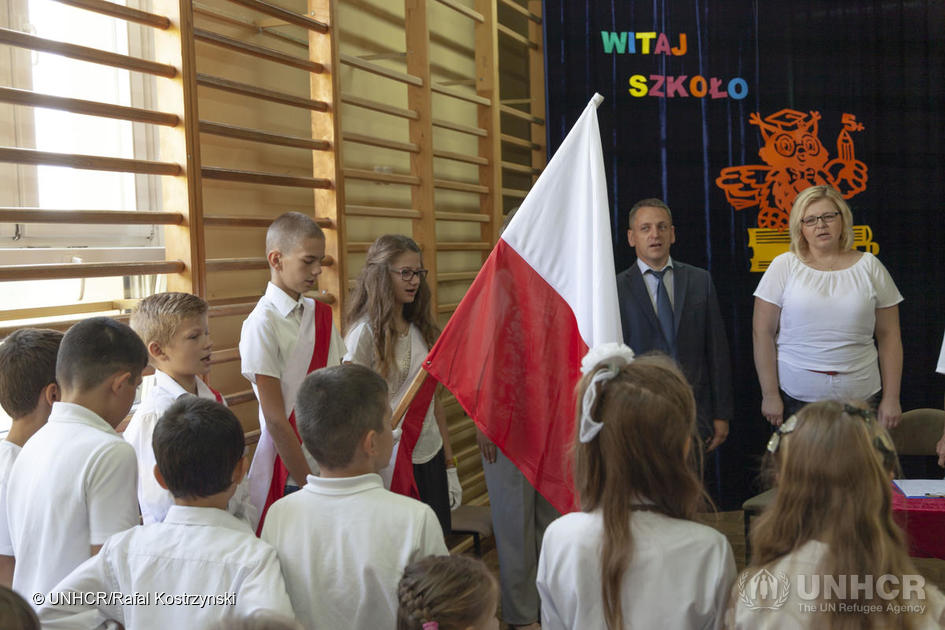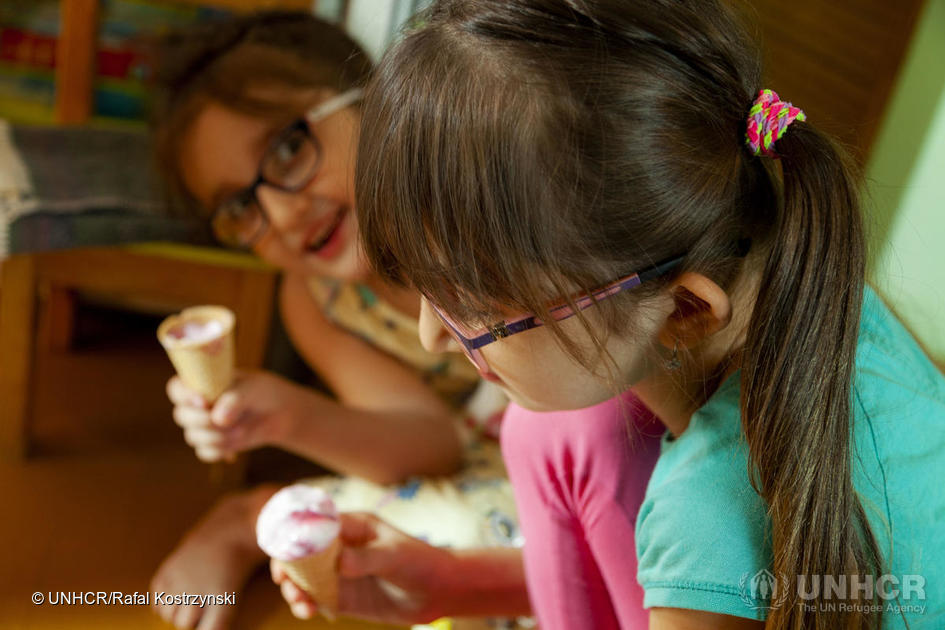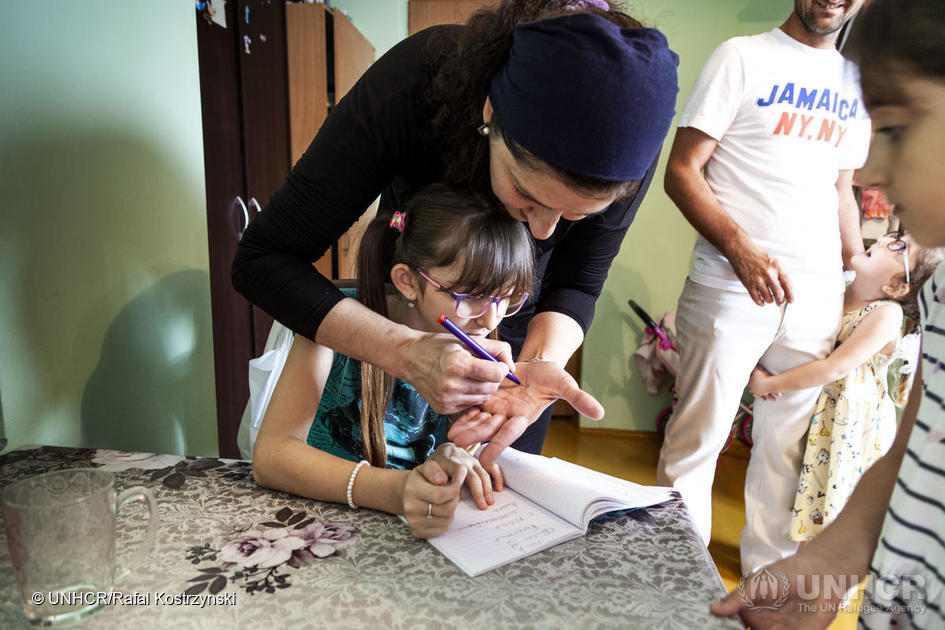Polish and Chechen children mingle in cheerful village school
“How could we not give flowers? It is a sign of respect,” says the girls’ father as he watches them going into class in the village of Berezówka in eastern Poland.
The small rural primary school, only eight km from the border with Belarus, has 54 pupils. Twenty-one of them are local children while 33 are ethnic Chechens from the Russian Federation. They are brought by bus every day from a nearby centre for asylum-seekers.
“To be honest,” says the head, “our school is only able to keep going thanks to the foreign children. They help to keep our numbers up.”
The school is run by a private association called Behind the Krzna River, whose chairwoman, Monika Dziobek, says the Polish and Chechen children mingle happily. “We have seen some beautiful cases of genuine friendship,” she says.
Today, the children and parents, all in their best clothes, are gathering in the school hall for the welcome ceremony. A Polish boy, wearing a sash and white gloves and flanked by two other children in sashes, carries the white and red Polish flag into the hall for the singing of the national anthem.
“We are pleased with the school. The teachers are good and there is a nice, friendly atmosphere.”
A Chechen mother, with her small son on her lap, gently stops him from playing with a water bottle during the headmistress’s speech.
“We are glad to be here,” says another Chechen mother. “This is a peaceful place, with freedom of speech. We are pleased with the school. The teachers are good and there is a nice, friendly atmosphere.”
After the ceremony, the children find their classrooms and teachers for the new term.
It is a legal requirement that the asylum-seekers send their children to school and this village school, catering for children from kindergarten age to 14, has shown kindness and imagination in accommodating them.
All the children follow the Polish curriculum, although the Chechens are excused Catholic religious education and observe their Muslim faith privately. There are extra language classes for those who have grown up speaking Chechen at home and Russian in wider society.
“Most of the children pick up Polish very quickly,” says language teacher Arkadiusz Rogulski.
“There are lots of complementary lessons — something like 500 a year — not only Polish language but also sport, environmental studies and crafts, all taught in Polish,” says Monika Dziobek. “We have received EU funding for this and we hope it will continue.”
Russian, needed in this border area that sees many visitors from Belarus and Ukraine, is taught as a foreign language to the older children in years seven and eight.
English is taught earlier, and a small group of seven-year-olds, with their parents, are checking out the class of English teacher Joanna Lubańska-Tymoszuk.
“English is taught through Polish, not Russian,” says one concerned Chechen parent. “So our children need to know Polish first before they can learn English.”
Lubańska-Tymoszuk, 29, beams reassuringly.
“I will use pictures and sounds,” she says. “I will show them pictures and write the words on the blackboard. With the younger ones, we might try to sing a song.”
The children are already sitting in their chairs, two Chechen girls in the front row, two Polish girls in the second row and a Chechen boy off to one side.
“Children are individuals,” laughs Polish mother of seven Jolanta Nowak. “They choose their friends according to their character and temperament. It happens naturally.”
The first day of school is short and by afternoon, the Chechen families are back in Horbowianka, a former hotel. Now it is run by the Polish Office for Foreigners, the government agency responsible for assessing asylum claims, as a home for new arrivals awaiting decisions on their cases.
The home houses 74 people, all from Chechnya.
Besides shelter and meals, the residents receive small monetary allowances and Polish lessons. After six months, they are allowed to work and some do seasonal or construction jobs.
One resident, who represents the Chechen community, helping to solve practical problems and smoothing any misunderstandings in the village, takes us to meet his family at the home.
“I used to visit my Mum every week. Now we only have WhatsApp.”
His wife opens the door to their cramped room. The couple have three daughters – the girls who took roses for the head.
“I never thought I would leave Chechnya but my mother encouraged me to go,” says the man’s wife. “I used to visit my Mum every week. Now we only have WhatsApp.
“I witnessed two wars in Chechnya and only finished seven years of school. I had wanted to be a nurse. Now, more than anything, I want my daughters to have education and opportunities for the future.”
Page 1 of 5
-

Mayor of small border town responds to a call of humanity
18 Aug 2022László Helmeczi was halfway through his second term as the mayor of a quiet town on the Hungarian – Ukrainian border, until one day he woke at the forefront of an international humanitarian crisis.
-
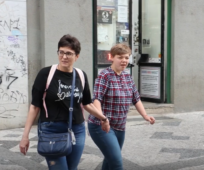
Ukrainian doctor and her daughter rebuilding their lives in Prague
30 Jun 2022Viktoriia is a doctor. She worked all her life helping others in Ukraine. Now UNHCR and its partners help her and her daughter get their lives back on track in Prague after having to flee Ukraine.
-

Ukrainian teenager touches Slovenians with sensitivity at the piano
17 May 2022Living in a world of sound, Vika, 13, is accompanied by an inner music that helps her find her way.
-

Cloud of uncertainty starts to lift for Ukrainian sisters fleeing war
20 Apr 2022Antonina and Natasha arrive in Slovakia without a plan. By evening, with help from UNHCR, they have beds and hope for the future…
-

Ukrainian-Syrian couple have their lives upended by outbreak of war
4 Apr 2022Katya is seeing war for the first time but her husband Youssef already has this bitter experience
-

UNHCR delivers first humanitarian airlift to Republic of Moldova for refugees from Ukraine
2 Mar 2022A humanitarian airlift organised by UNHCR, the UN Refugee Agency, arrived this morning at the Chisinau international airport in Moldova from its Dubai-based global stockpile.
-

Virtual reality helps filmgoers see the reality for refugees
1 Feb 2022With goggles provided by UNHCR, visitors to a film festival in Slovakia can experience the refugee world in 3D.
-
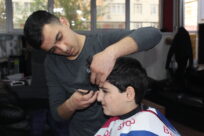
Afghan refugee at the cutting edge in Chișinău with a job at a barber’s
9 Dec 2021Yema Torkani, 18, has chosen to work rather than study to support his family, as they make new lives in the capital of Moldova.
-

Honeymoon city becomes home for Syrian couple in Prague
20 Sep 2021The fairy tale goes on for Abdul and Silva as they adapt to a new life in the Czech Republic
-
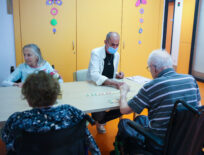
Iranian asylum seeker finds his calling in caring for the elderly
23 Aug 2021Reza feels that fate has brought him to Slovenia, and to a job where he can make a difference.

